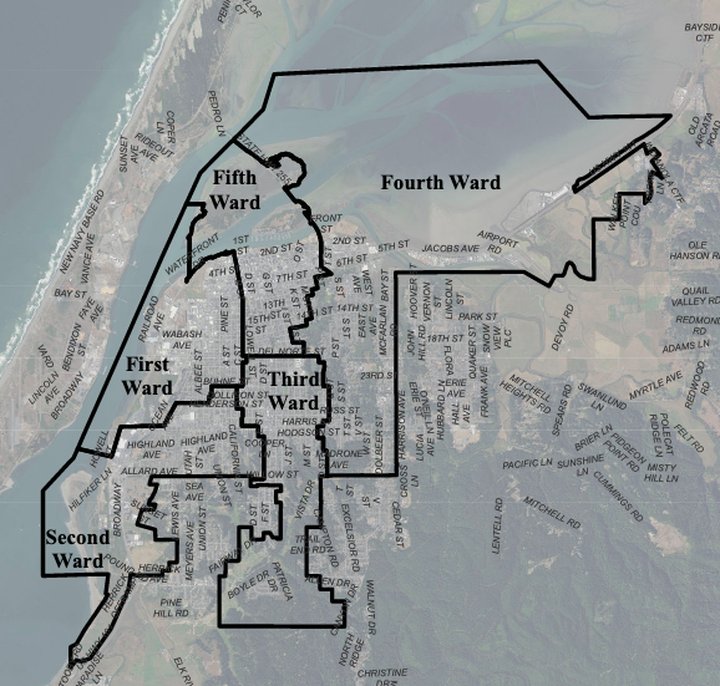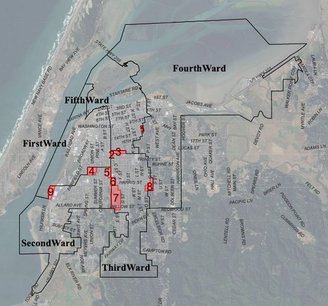
Map of the new proposed Eureka Wards | Image from Eureka city staff report
###
If you live in Eureka you’ll want to pay close attention to tonight’s Eureka City Council meeting — during which there will be a public hearing on the adoption of new ward boundaries in the city — because, depending on where you live, there is a chance you will soon inhabit a different ward.
The proposed changes to Eureka’s ward boundaries are actually pretty minimal, so you will only be affected if you live in one of the nine relatively small pockets of the city where the ward lines will be redrawn. The proposed map — drawn and recommended by Eureka city staff — was selected by the council out of six different maps, which the council reviewed during its Oct. 19 meeting. The other five maps were drawn by members of the public through LoCOs very own “Let’s Redistrict Eureka!” game, but sadly did not make the cut. The primary reason the council favored the map it did is that it contains the least amount of changes to the existing ward map, meaning less people will be affected.
So, why is the City changing the ward boundaries at all? Because the 2020 Census data showed that Eureka’s population has shifted pretty dramatically since 2010, leaving the current ward populations out of balance. The purpose of adopting the new map is to ensure that the ward populations are as balanced as possible and that each councilmember represents roughly the same number of people.

Map showing the areas of change with the new ward boundaries
If you are one of the Eureka residents who would be moved to a different ward, don’t worry! The change won’t affect you much, except — since the city adopted the true ward system — it will impact who you are able to vote for in city council elections. If you live in the First, Third or Fifth Ward, then you’ll be electing a councilmember in November 2022.
Whether or not you’ll be impacted by the change, you can voice your comments or concerns during the public hearing tonight, which will occur toward the beginning of the council meeting.
###
In other election-related business, the council will look at implementing a Ranked Choice Voting (RCV) system, which was approved by Eureka voters in 2020 by way of Measure C. The passage of Measure C essentially authorized the city council to amend the city’s charter to institute ranked choice voting, the process for which the council will begin during tonight’s meeting.
If you voted on the issue during the 2020 election, you probably understand at least a little about how the system works. But in case you’re confused, here is a quick rundown from the city staff report:
RCV is an alternative to the standard methods of conducting municipal elections in California. These are either (a) a primary election followed by a potential separate run-off election in order to achieve a 50%+1 winner or (b) a single election with the highest plurality (not necessarily majority) vote-getter being elected. The second is Eureka’s current method of choosing Council members and the Mayor.
When there are more than two candidates for one seat, RCV [Ranked Choice Voting] allows voters to rank candidates for that seat in order of preference when marking their ballots. Only one candidate can represent each of the voter’s first, second or third, etc., choices.
Functionally, when electing a single candidate using RCV – as in a race for mayor or ward council member with more than two candidates – all first choices are tallied in the first round. If any candidate receives a majority of the first choices, that candidate is elected.
If no candidate receives a majority, the “instant run-off” process is triggered. The candidate receiving the fewest first choices is eliminated, and the voters for that eliminated candidate now have their second choices counted. The ballots are again tallied and the process will continue through subsequent rounds until one candidate wins a majority.
This does mean that Eureka voters will need to get used to a new system for casting and counting votes and there will probably be a bit of a learning curve. But the changes will likely not happen right away. If the council moves forward with an ordinance tonight, it will be brought back for adoption as soon as the next council meeting. The City Elections Office will then need to coordinate with the Humboldt County Registrar of Voters to implement the system. Ranked Choice Voting could be implemented as soon as the 2022 Municipal General Election, but may be as late as the 2024 election.
###
The council will also consider adopting an ordinance that would prohibit storage and handling of coal and coal-related substances on city-owned property, an action prompted by news that a mysterious corporation is attempting to take over North Coast Railroad Authority’s right-of-way between Humboldt Bay and the San Francisco Bay Area in order to facilitate large-scale coal exports.
The ordinance, which council discussed during its Oct. 19 meeting, was initially designed to also prohibited the transportation of coal over city-owned property. But the council agreed that it would be legally difficult to regulate the transportation of coal. The ordinance has also been changed to include the prohibition of petroleum coke on city-owned property. Petroleum coke, as defined by the staff report, is “ solid carbonaceous residue produced from a coker after cracking and distillation from petroleum refining operations, including such residues produced by petroleum upgraders in addition to petroleum refining.”
###
The Eureka City Council meets virtually on Tuesday, Nov. 16 (tonight) at 6 p.m. You can view the full agenda and directions on how to participate here.
###
CORRECTION: This article has been changed to reflect that residents of Eureka’s First, Third and Fifth Wards will be electing councilmembers in Nov. 2022.
CLICK TO MANAGE